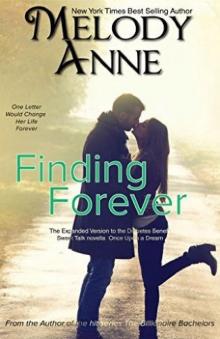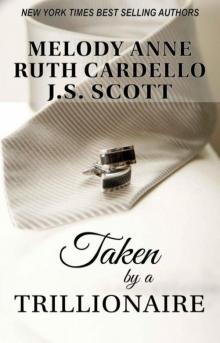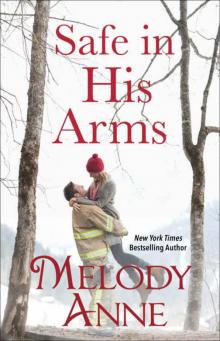- Home
- Melody Anne
Her Hometown Hero
Her Hometown Hero Read online
Thank you for downloading this Pocket Books eBook.
* * *
Join our mailing list and get updates on new releases, deals, bonus content and other great books from Pocket Books and Simon & Schuster.
CLICK HERE TO SIGN UP
or visit us online to sign up at
eBookNews.SimonandSchuster.com
This book is dedicated to my dirty girls, Stephanie Gerard and Nicole Sanders. For twenty-plus years, we have been through thick and thin. And I pray that we never grow up, never stop dancing, and definitely never stop dreaming. Without dreams, wishes would never come true. I love you girls!
ACKNOWLEDGMENTS
As I continue this journey in this magical land of writing, I have so much to be thankful for that a single page or two in a book could never possibly express how happy I am and how grateful I am to the people who make my world a better place. There are times I don’t see anyone for days or weeks while I finish up a story, but you all hold your arms wide open when I return and that means more to me than you could ever imagine.
I have friends and family, some of whom I have had my entire life and some whom I’ve been blessed with in the later years, and each and every one of you makes my life complete.
I live in a small town, which is why I write so much about family, because that’s what living in a small town is: it’s having a huge extended family, where people wave when you drive or walk by and where if someone asks if there’s anything they can do for you, they mean it. I love that and never want to change it. Thank you to my community for inspiring me and supporting me. I am so glad to have raised my kids in a safe and beautiful place.
Thank you to my family at Pocket Books who make me feel like a rock star and who support me, encourage me, and make me feel like I have a place in this world where I’m allowed to let my imagination come to life on paper.
Thank you to my team at home who work long hours, keep me sane, and remind me to live a little. Without you, I couldn’t do what I love!
Thank you to my family, my beautiful daughter and son, my husband, and my four dogs. Home is my safety net. It’s my favorite place to be, and nothing brings me greater pleasure than to have it filled with all the people I love.
Thank you to my fans! You have been with me from the beginning and your encouraging words inspire me, motivate me, and often bring me to tears. There are so many who mean the world to me, and I’ve been lucky enough to meet several of you. You inspire me more than anything else. Cynthia Pak, I still think of you each time I brush my teeth after our crazy time in New Orleans. I love you all so much. Thank you, thank you, thank you.
PROLOGUE
“Hi, sweetheart, how are you doing?” Bethel asked in a frail voice, crossing her fingers that her acting abilities would carry her through this phone call.
“I’m fine, Grandma,” Sage said unsurely. “But you sound a little unlike yourself. What’s the matter?”
The girl’s voice was full of worry. Check, Bethel thought.
“Oh, I don’t want to bother you, dear. I know how busy you are.” Bethel couldn’t help adding a long-suffering sigh. “I was just wondering how the residency applications have been going. Have you had any offers?” If Sage had even the slightest clue about the amount of meddling her grandmother was planning, Bethel would be toast—very burned toast.
Of course, she couldn’t have done any meddling at all without the help of her friends Judge Martin Whitman, Eileen Gagnon, Maggie Winchester, and the ultimate meddler, Joseph Anderson—but her lips were forever sealed, for all their sakes.
“It’s great, Grandma. I have six interviews scheduled over the next two weeks. I’m really hoping to get in at Johns Hopkins. It would do wonders for my career.”
“That’s wonderful to hear,” Bethel said, and immediately began coughing.
“Grandma? Are you okay?”
Bethel felt a mountain load of guilt as she faked an illness she was far from feeling. “Just . . . a . . . minute . . .” she gasped, then put the phone on mute so Sage couldn’t hear her.
“Are you sure we should do this to Sage?” she asked her best friend, Eileen.
“It’s up to you. I’m feeling pretty guilty,” Eileen replied.
“I just worry so much about her,” Bethel said. “I want her home.”
“Grandma! Are you there? Do I need to call emergency services?”
Bethel quickly unmuted the phone.
“I’m all right, darling. Don’t you worry about me,” Bethel said weakly. “What about the hospital near home? Did you apply?”
“I struggled with whether to do that or not, but in the end I did. It would be great to get to see you more often, but it just feels like I’m giving up if I come home. People usually grow up and move away, not run back home the first chance they get,” Sage told her.
“Honey, it’s not giving up to come home. Sterling may be tiny, but the hospital has an incredible program. We have excellent doctors acting as mentors, and you’d also be here where you belong.” At least that was true—it was a prestigious hospital, thanks to its generous endowment from the Whitmans and the Winchesters.
“Yeah, I know all of that. There are several people in my class who are hoping to get in there. I just didn’t want to ever move back home unless it was for a terrific job. Then I could feel proud of myself—like I’d really accomplished something while out in the big, bad world.”
“You have accomplished something—something huge. How many of your fellow college students went on to medical school and were always at the very top of their class? How many kids from your own high school even went to college?”
“Not many, but that’s not the point.”
“Of course it’s the point. You are a success no matter what you do from this point forward. You’ve done so well, darling, and you set your sights admirably high. So be proud of that, but don’t miss out on interviewing here. Or are you afraid to try? It’s possible the hospital wouldn’t even offer you a residency.” Bethel knew pigs would fly before that happened—Sage was guaranteed an offer. But the girl’s grandmother was proud of her sly use of psychology. Suggest that Sage might not get something, and she’d jump to prove she could.
Sage didn’t take the bait. “That wouldn’t be the end of the world, I have to say. If I came home, I’d just be dealing with ranchers all the time instead of city trauma. It’s not exactly the most exciting place to continue my medical education.”
“Now, Sage, you shouldn’t speak so badly about the hospital here. It’s saved my life more than once. You remember when I had that stroke a couple of years ago? Well, they fixed me up real nice. Eileen says no one would have any idea that I almost died!”
“You didn’t almost die, Grandma. It was a minor stroke, though you scared me to pieces.”
“I don’t like frightening you, child,” Bethel said before forcing herself to cough pathetically again. It was a good thing they weren’t on a video call, because she couldn’t wipe the smile off her face. She wasn’t one to brag, but surely she’d have made a big splash in Hollywood.
“Well then, don’t say you came close to dying,” Sage told her. “You know it would destroy me.”
“Okay, dear. I’m afraid I can’t visit too long—I’m just not feeling all that well, but I’m sure it’s nothing serious,” Bethel said in a quavering voice. “Besides, I don’t want to bother you . . .”
“You know you’re never a bother, Grandma. Please talk to me. I’m starting to really worry.”
“Well . . . The doctor did say he’s worried about my blood pressure. I just can’t seem to get around as well these days . . .” Bethel trailed off as if too weak to continue speaking.
“You should have called me right away! I did
n’t know anything was wrong. How long have you been feeling ill?” Sage had begun to scold her grandma, but she immediately backed down, her voice lowering as quickly as it had risen.
“I’m sorry, sweetheart. I didn’t think it was that big of a deal. I’m going to have to get off the phone, though. I’m really tired now. Just keep me updated on your choice for your residency.” Before Sage could say anything more, Bethel hung up, then grinned at her friend.
“You know, we are horrible, horrible people,” Eileen said with a wicked grin, enhancing the slight wrinkles on her face.
“How else was I supposed to get her home?” Bethel asked. “She’s so dang stubborn and thinks she can make it all on her own in some big city. It’s time for her to come home and settle down. Besides, I am a frail old woman.” The twinkle in her eye and the weekly dancing lessons she took belied her words. She did a mean cha-cha.
“Frail, my foot,” Eileen scoffed. The two women had been friends for over fifty years, and neither of them could get anything past the other. “Still, I don’t know about all of this. If Sage finds out—gets even an inkling of what we have planned . . .”
“It’s worth the risk, my dearest friend,” Bethel said. She called Martin and Maggie so the foursome could put Joseph Anderson on speakerphone and they could all go over the plans again. If Sage had known what was brewing, she wouldn’t be happy with any of them.
But a bit of matchmaking is what kept the five friends young at heart. They suppressed their feelings of guilt as best they could. It was painful, but what else could they do? They had a new mission—and it was a doozy.
The Montana road was familiar, but Sage Banks was tense as she drove for endless miles without passing a single vehicle. In the spring, summer, and fall, the area was usually spectacular and welcoming, with the wheat blowing in the wind, birds singing their magical melodies, and farmers smiling with a polite nod as you passed by.
It was night, however, and she was caught in the middle of a summer storm, making visibility basically zilch. The rain slashed across her window and the wind pushed her car around like a toy.
The blacktop looked treacherous. Thick puddles of water from the unexpected June storm formed small lakes on the asphalt. Sage kept her foot light on the gas pedal and her fingers clutched the steering wheel like a vise.
“Perfect. Just perfect,” she muttered as the car hydroplaned for a heart-stopping second before straightening out again.
She hated driving in this kind of weather, hated that it reminded her every single time of the loss of her parents and her grandfather, who had lost their lives too soon when their vehicle had slid off the road into the river.
She couldn’t think about that right now, couldn’t focus on something that would make her tear up, make her visibility even worse than it was. No. It was better to think about the fact that she was driving here in the first place.
She hadn’t wanted to accept what in her book counted as failure—to come back to the place she’d worked hard to move away from. She’d won a big scholarship, worked her tail off, and made it through medical school. Residency was her time to shine, but it was really hard to shine at a place where everyone had known you since you were a little girl.
Her boss, Dr. Thompson, was going to be the man who’d bandaged her knee when she took a tumble down Rice Hill, stitched her up when she fell off her bike, bruising her ego far more than her body, and seen her when, embarrassment of embarrassments, she needed her first “young woman” appointment. He had to be a hundred years old by now.
It just wasn’t fair.
Even to herself she sounded like a petulant child, but . . . She shook her head to change her focus. This topic wasn’t any better to think about. First she had to pay more attention to the road. And then she had to accentuate the positive. She’d get to spend more time with her grandmother, and she loved Grandma Bethel more than any other person on this planet. Bethel had always told her that when life handed you lemons, you got to make lemonade.
“I guess I’ll be making a lot of lemonade over the next several years,” she muttered with a strained laugh. It was time she accepted her fate with a smile.
But since her grandfather had died in the same wreck that had taken Sage’s parents, she had an unbreakable bond with her grandmother. They needed each other, and it had been just the two of them since she was ten years old.
Plus, it wasn’t like her to throw tantrums or to dwell on her “misfortunes.” She knew a number of good students who hadn’t received any offers of residencies, and she’d been offered several. She also knew that a lot of residents would never become full-fledged doctors. If she didn’t pull herself together, and fast, she could end up throwing everything she’d worked so hard for right into the garbage can.
She had chosen to accept this position. The thought of being two thousand miles away when her grandma needed her had been thoroughly unappealing. So, as much as she hadn’t wanted to come back home, it had been the right decision. She refused to regret it.
As Sage topped a rise in the road and neared the picturesque town of Sterling, she thought of the people she’d met in Stanford and LA—where she’d gone for her undergraduate and graduate programs—who would never consider being stuck in a town like Sterling, Montana.
Maybe they were right. But it was still home, and whether she liked it or not, she was back for at least three years. This won’t be so bad, she told herself with a determined glint in her eyes. Call it a midyear resolution.
As Sage came down the other side of the hill, another car turned a corner, and its lights temporarily blinded her. She focused on the wet pavement and the barely visible lines on the side of the road, but she turned the steering wheel too far to the left as she tried to regain her bearings.
A horn blared, and before she could stop the car, she felt her tires slipping on the water and loose gravel on the shoulder of the road. The ditch was quickly coming up to meet her, and it wasn’t looking too friendly.
“Perfect!”
That was the only word that made it past her lips before the car skidded down into the hard earth and her head slammed against the steering wheel. Her fear vanished as everything went black.
THAT HAD BEEN too close. His heart in his throat, Spence Whitman pulled over to the side of the road, turned on his emergency flashers, and leapt from his car, leaving his door swinging in the strong wind as he dashed into the ditch. There wasn’t any smoke right now, but that didn’t mean it wasn’t coming. He needed to assess the condition of the driver and do it fast.
Pulling his phone from his coat pocket as he scrambled down the bank, he dialed emergency services, connecting just as he reached the car.
“Nine-one-one. What’s your emergency?”
Spence had yanked open the door to find a red-haired woman pressed against the steering wheel, a slight line of blood dripping down her cheek. “It looks like a twenty- to thirty-year-old female. Unconscious. Her car slammed hard into the ditch between milepost seventeen and eighteen. She has a visible contusion on her right cheek and a rapidly forming contusion on her forehead.”
“Are you a doctor, sir?”
“Yes. This is Dr. Spence Whitman.”
“Emergency vehicles are on their way.”
“Thank you.” Spence hung up the phone as he began checking her vital signs. “Ma’am, are you okay?”
It was stupid to ask that question, or any question, when she was clearly knocked out. He knew this, but he couldn’t help it, not when it was so ingrained in him from his training. Lifting his hand to her neck, he was relieved to find her pulse strong. Though she was out cold, at least she was breathing steadily, and the bleeding from the cut on her cheek was already slowing.
He ran his hand carefully along her body and was happy that he didn’t discover any obvious signs of serious injury. That didn’t mean there wasn’t internal damage, but as smoke began rising from the hood of her car, he didn’t want to take any chances by hanging around. He nee
ded to move her.
Just then, she moaned and her eyelids fluttered open. She blinked up at him with confused emerald-green eyes.
“You’ve been in an accident,” he informed her in his most businesslike manner. “Can you tell me if anything hurts?”
She stared blankly at him while she tried to get a handle on his words.
“My name is Spence Whitman and I’m a doctor. I need to move you from the vehicle. Can you tell me if your neck or back hurts?”
“No, they don’t,” she murmured after a brief pause.
“That’s really good. Could you please lift your arm for me and wiggle your fingers?” After another pause, she did as he asked. “Great,” he said. “Now I’m pulling off your shoe. If you could just wiggle your toes for me . . . Great. That’s a very good sign.” He kept his voice professional, calm, reassuring. It was what he did and he was on autopilot.
“Okay, we’re going to get you out of this car now.” He didn’t grab her right then, but waited for her to answer. It was difficult for him to move so slowly, but he didn’t want her frightened, and because she’d hit her head, there was a chance she wasn’t fully processing what he was saying.
“Okay,” she said, her voice weak.
“We’re going to be nice and careful about this,” he said as he slid his hands beneath her and began shifting her weight against his chest. Dark gray smoke began to billow from the hood of the car, making it more apparent that their time was running out.
She groaned when he stood, cradling her close before he began moving cautiously away from the car in the heavy rain. He knew this had to be hurting her more than she’d expected—it was difficult to know how much you’d been hurt in a car accident until you moved. Finally, sirens blared in the distance, filling Spence with relief.
“Spence?”
Spence stopped as he looked down at the woman in the quickly fading light. She’d said his name like she knew him.

 Seduced
Seduced Surrender
Surrender Scorched
Scorched Submit
Submit Rising (Anderson Special Ops Book 2)
Rising (Anderson Special Ops Book 2) Barriers: Anderson Special Ops - Book 3
Barriers: Anderson Special Ops - Book 3 Declan (Undercover Billionaire Book 4)
Declan (Undercover Billionaire Book 4) Hudson
Hudson Owen (Undercover Billionaire Book 3)
Owen (Undercover Billionaire Book 3) Submit (Surrender Series Book Two)
Submit (Surrender Series Book Two) Broken
Broken Stolen Innocence (Becoming Elena #1)
Stolen Innocence (Becoming Elena #1) The Tycoon's Proposal
The Tycoon's Proposal Finding Forever
Finding Forever Burned
Burned Arden
Arden Kian
Kian Holiday Treasure (Billionaire Bachelors - Book 10)
Holiday Treasure (Billionaire Bachelors - Book 10) Her Forever Hero (Unexpected Heroes)
Her Forever Hero (Unexpected Heroes) Blackmailing The Billionaire (Billionaire Bachelors - Book 5)
Blackmailing The Billionaire (Billionaire Bachelors - Book 5) Torn (Torn Series, Book 1)
Torn (Torn Series, Book 1) The Tycoon's Revenge (Baby for the Billionaire - Book One)
The Tycoon's Revenge (Baby for the Billionaire - Book One) Betrayed
Betrayed The Lost Tycoon
The Lost Tycoon Who I Am With You
Who I Am With You Fall Into Love
Fall Into Love Unexpected Treasure - With TOC -Final -
Unexpected Treasure - With TOC -Final - Hidden Treasure
Hidden Treasure Priceless Treasure
Priceless Treasure Virgin to Conquer (Taken by a Trillionaire Series)
Virgin to Conquer (Taken by a Trillionaire Series) Turbulent Waters (Billionaire Aviators Book 3)
Turbulent Waters (Billionaire Aviators Book 3) Tattered (Torn Series, Book 2)
Tattered (Torn Series, Book 2) The Billionaire's Dance (Billionaire Bachelors - Book Two)
The Billionaire's Dance (Billionaire Bachelors - Book Two) The Billionaire's Marriage Proposal (Billionaire Bachelors Series - Book 4)
The Billionaire's Marriage Proposal (Billionaire Bachelors Series - Book 4) Scorched s-4
Scorched s-4 Runaway Heiress
Runaway Heiress Arden (Undercover Billionaire Book 2)
Arden (Undercover Billionaire Book 2) Her Unexpected Hero
Her Unexpected Hero Taken By a Trillionaire
Taken By a Trillionaire Hunter
Hunter Safe in his Arms
Safe in his Arms Forever Lost: Becoming Elena - Book Two
Forever Lost: Becoming Elena - Book Two The Billionaire's Final Stand
The Billionaire's Final Stand Turbulent Intrigue (Billionaire Aviators Book 4)
Turbulent Intrigue (Billionaire Aviators Book 4) The Tycoon's Vacation (Baby for the Billionaire - Book Two)
The Tycoon's Vacation (Baby for the Billionaire - Book Two) The Billionaire Falls (Billionaire Bachelors - Book Three)
The Billionaire Falls (Billionaire Bachelors - Book Three) Turbulent Desires (Billionaire Aviators Book 2)
Turbulent Desires (Billionaire Aviators Book 2) Following Her
Following Her Turbulent Intentions
Turbulent Intentions Her Hometown Hero
Her Hometown Hero Kian (Undercover Billionaire Book 1)
Kian (Undercover Billionaire Book 1)